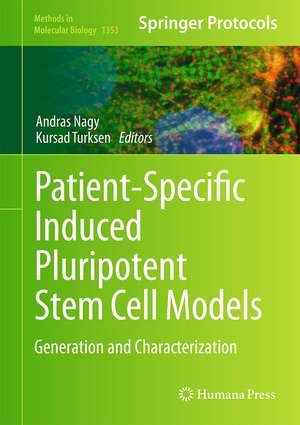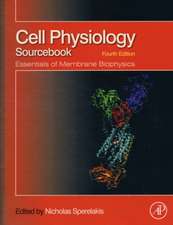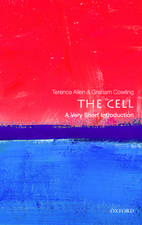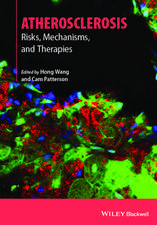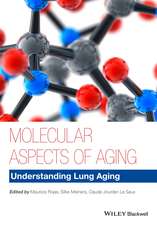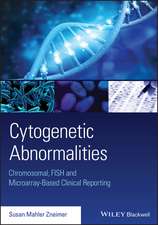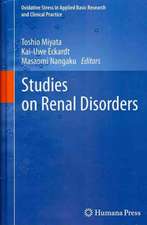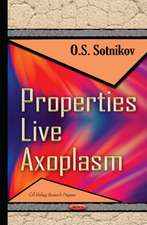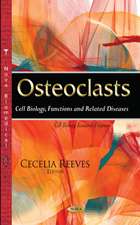Patient-Specific Induced Pluripotent Stem Cell Models: Generation and Characterization: Methods in Molecular Biology, cartea 1353
Editat de Andras Nagy, Kursad Turksenen Limba Engleză Hardback – 8 noi 2015
Authoritative and practical, Patient-Specific Induced Pluripotent Stem Cell Models: Generation and Characterization is an ideal reference for scientists working on furthering iPS research.
| Toate formatele și edițiile | Preț | Express |
|---|---|---|
| Paperback (1) | 649.22 lei 6-8 săpt. | |
| Springer – 23 aug 2016 | 649.22 lei 6-8 săpt. | |
| Hardback (1) | 914.20 lei 3-5 săpt. | |
| Springer – 8 noi 2015 | 914.20 lei 3-5 săpt. |
Din seria Methods in Molecular Biology
- 9%
 Preț: 791.59 lei
Preț: 791.59 lei - 23%
 Preț: 598.56 lei
Preț: 598.56 lei - 20%
 Preț: 882.95 lei
Preț: 882.95 lei -
 Preț: 252.04 lei
Preț: 252.04 lei - 5%
 Preț: 802.69 lei
Preț: 802.69 lei - 5%
 Preț: 729.61 lei
Preț: 729.61 lei - 5%
 Preț: 731.43 lei
Preț: 731.43 lei - 5%
 Preț: 741.30 lei
Preț: 741.30 lei - 5%
 Preț: 747.16 lei
Preț: 747.16 lei - 15%
 Preț: 663.45 lei
Preț: 663.45 lei - 18%
 Preț: 1025.34 lei
Preț: 1025.34 lei - 5%
 Preț: 734.57 lei
Preț: 734.57 lei - 15%
 Preț: 664.61 lei
Preț: 664.61 lei - 15%
 Preț: 654.12 lei
Preț: 654.12 lei - 18%
 Preț: 1414.74 lei
Preț: 1414.74 lei - 5%
 Preț: 742.60 lei
Preț: 742.60 lei - 20%
 Preț: 821.63 lei
Preț: 821.63 lei - 18%
 Preț: 972.30 lei
Preț: 972.30 lei - 15%
 Preț: 660.49 lei
Preț: 660.49 lei - 5%
 Preț: 738.41 lei
Preț: 738.41 lei - 18%
 Preț: 984.92 lei
Preț: 984.92 lei - 5%
 Preț: 733.29 lei
Preț: 733.29 lei -
 Preț: 392.58 lei
Preț: 392.58 lei - 5%
 Preț: 746.26 lei
Preț: 746.26 lei - 18%
 Preț: 962.66 lei
Preț: 962.66 lei - 23%
 Preț: 860.21 lei
Preț: 860.21 lei - 15%
 Preț: 652.64 lei
Preț: 652.64 lei - 5%
 Preț: 1055.50 lei
Preț: 1055.50 lei - 23%
 Preț: 883.85 lei
Preț: 883.85 lei - 19%
 Preț: 491.88 lei
Preț: 491.88 lei - 5%
 Preț: 1038.84 lei
Preț: 1038.84 lei - 5%
 Preț: 524.15 lei
Preț: 524.15 lei - 18%
 Preț: 2122.34 lei
Preț: 2122.34 lei - 5%
 Preț: 1299.23 lei
Preț: 1299.23 lei - 5%
 Preț: 1339.10 lei
Preț: 1339.10 lei - 18%
 Preț: 1390.26 lei
Preț: 1390.26 lei - 18%
 Preț: 1395.63 lei
Preț: 1395.63 lei - 18%
 Preț: 1129.65 lei
Preț: 1129.65 lei - 18%
 Preț: 1408.26 lei
Preț: 1408.26 lei - 18%
 Preț: 1124.92 lei
Preț: 1124.92 lei - 18%
 Preț: 966.27 lei
Preț: 966.27 lei - 5%
 Preț: 1299.99 lei
Preț: 1299.99 lei - 5%
 Preț: 1108.51 lei
Preț: 1108.51 lei - 5%
 Preț: 983.72 lei
Preț: 983.72 lei - 5%
 Preț: 728.16 lei
Preț: 728.16 lei - 18%
 Preț: 1118.62 lei
Preț: 1118.62 lei - 18%
 Preț: 955.25 lei
Preț: 955.25 lei - 5%
 Preț: 1035.60 lei
Preț: 1035.60 lei - 18%
 Preț: 1400.35 lei
Preț: 1400.35 lei
Preț: 914.20 lei
Preț vechi: 1114.88 lei
-18% Nou
Puncte Express: 1371
Preț estimativ în valută:
174.93€ • 182.64$ • 144.78£
174.93€ • 182.64$ • 144.78£
Carte disponibilă
Livrare economică 15-29 martie
Preluare comenzi: 021 569.72.76
Specificații
ISBN-13: 9781493930333
ISBN-10: 1493930338
Pagini: 350
Ilustrații: XIII, 368 p.
Dimensiuni: 178 x 254 x 22 mm
Greutate: 1.11 kg
Ediția:1st ed. 2016
Editura: Springer
Colecția Humana
Seria Methods in Molecular Biology
Locul publicării:New York, NY, United States
ISBN-10: 1493930338
Pagini: 350
Ilustrații: XIII, 368 p.
Dimensiuni: 178 x 254 x 22 mm
Greutate: 1.11 kg
Ediția:1st ed. 2016
Editura: Springer
Colecția Humana
Seria Methods in Molecular Biology
Locul publicării:New York, NY, United States
Public țintă
Professional/practitionerCuprins
Generation of Patient-Specific Induced Pluripotent Stem Cell from Peripheral Blood Mononuclear Cells by Sendai Reprogramming Vectors.- A Doxycycline-Inducible System for Genetic Correction of iPSC Disease Models.- Generation and Characterization Of Patient-Specific Induced Pluripotent Stem Cell For Disease Modeling.- Modeling Genomic Imprinting Disorders Using Induced Pluripotent Stem Cells.- Generation and Characterization of Induced Pluripotent Stem Cells from Patients with mtDNA Mutations.- Skin Biopsy and Patient-Specific Stem Cell Lines.- Directed Myogenic Differentiation of Human Induced Pluripotent Stem Cells.- Using Human Induced Pluripotent Stem Cells to Model Skeletal Diseases.- Modeling Cardiovascular Diseases with Patient-Specific Human Pluripotent Stem Cell-Derived Cardiomyocytes.- Calcium Imaging in Pluripotent Stem Cell-Derived Cardiac Myocytes.- Patient-Specific Induced Pluripotent Stem Cell Models: Generation and Characterization of Cardiac Cells.- Differentiation of Human Pluripotent Stem Cells to Cardiomyocytes Under Defined Conditions.- Generation of Cardiomyocytes from Pluripotent Stem Cells.- Generation and Characterization of Patient-Specific iPSC-Model for Cardiovascular Disease.- Transgene-Free Disease-Specific iPSC Generation from Fibroblasts and Peripheral Blood Mononuclear Cells.- Generation and Neuronal Differentiation of Patient-Specific Induced Pluripotent Stem Cells Derived from Niemann-Pick Type C1 Fibroblasts.- Multisystemic Disease Modeling of Liver-Derived Protein Folding Disorders Using Induced Pluripotent Stem Cells (iPSCs).- In Vitro Modeling of Alcohol-Induced Liver Injury Using Human Induced Pluripotent Stem Cells.- Generation of Human Induced Pluripotent Stem Cells Using RNA-Based Sendai Virus System and Pluripotency Validation of the Resulting Cell Population.- Modeling Axonal Phenotypes with Human Pluripotent Stem Cells.- Mitochondrial Disease-Specific Induced Pluripotent Stem Cell Models: Generation and Characterization.- Patient-Specific Induced Pluripotent Stem Cell Models: Characterization of iPS Cell-Derived Cardiomyocytes.- Generation of Integration-Free Patient Specific iPS Cells Using Episomal Plasmids Under Feeder Free Conditions.
Textul de pe ultima copertă
This volume captures the rapid developments in the field of induced pluripotent stem (iPS) cells, which have provided novel opportunities and approaches both for better understanding a number of human diseases and for developing new platforms for drug development and screening for such diseases. Specifically, representative protocols on various disease models have been collected from labs around the world. Written for the highly successful Methods in Molecular Biology series, chapters include introductions to their respective topics, lists of the necessary materials and reagents, step-by-step, readily reproducible laboratory protocols, and tips on troubleshooting and avoiding known pitfalls.
Authoritative and practical, Patient-Specific Induced Pluripotent Stem Cell Models: Generation and Characterization is an ideal reference for scientists working on furthering iPS research.
Authoritative and practical, Patient-Specific Induced Pluripotent Stem Cell Models: Generation and Characterization is an ideal reference for scientists working on furthering iPS research.
Caracteristici
Includes cutting-edge methods and protocols for studying patient-specific iPS cells Provides step-by-step detail essential for reproducible results Contains key notes and implementation advice from the experts
